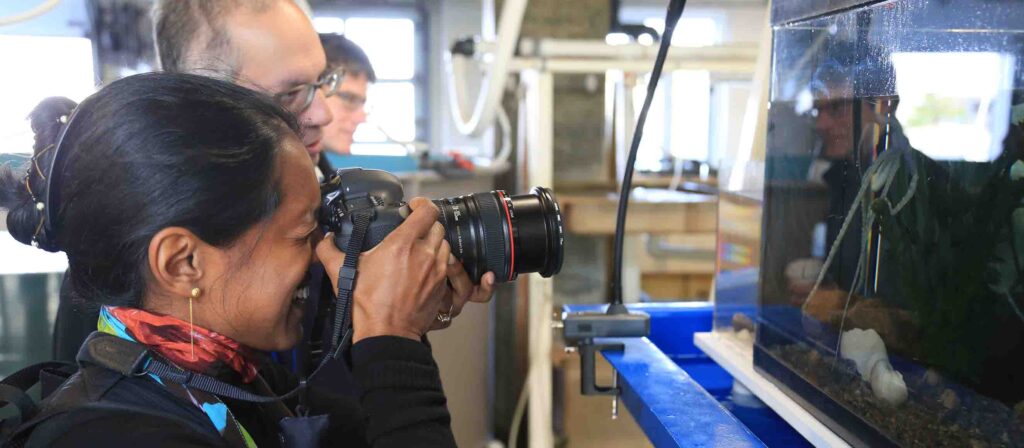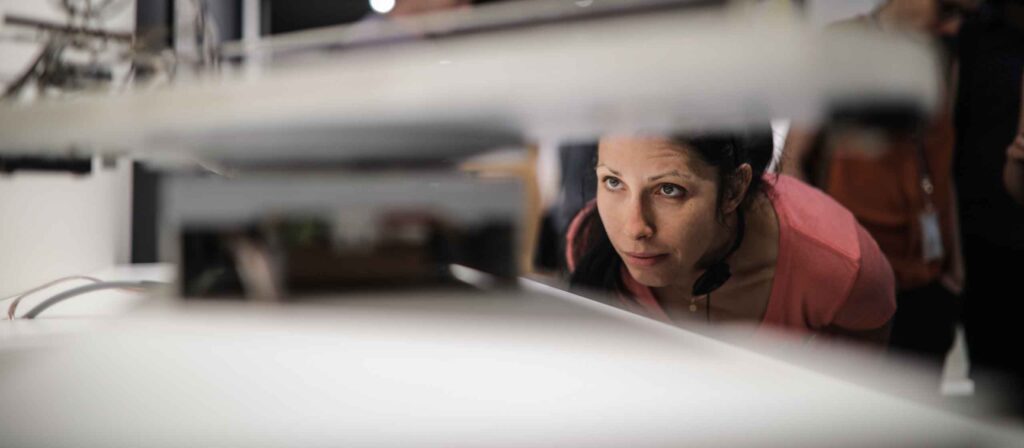Knight Science Journalism Academic-Year Fellowship
Applications for the 2024-2025 Knight Science Journalism Fellowships have closed. To receive a reminder when applications open next year, sign up for our mailing list.
Nine Months Embedded in a Hub of Innovation
Every year, the Knight Science Journalism Program at MIT offers academic-year fellowships to 10 science journalists from around the globe, giving them an opportunity to explore science, technology, and the craft of journalism; to concentrate on a specialty in science; and to learn at some of the top research universities in the world.
Time to Pursue a Passion Project
While in Cambridge, fellows will pursue a research project that uniquely leverages the resources and connections available to them at MIT and in the surrounding greater Boston area.
The research project must be journalism related. Previous fellows have used their time to: conduct research and reporting for a long-form narrative or story series; develop multimedia, video, and audio reporting projects; do research for a book proposal; and build deep knowledge of a new area of science, among other project pursuits. Regular meetings are held to monitor and help with projects. Fellows deliver formal presentations about their projects at the end of the academic year; many projects are published as magazine articles, books, videos or podcasts after the fellowship ends.
Rich Variety of Programming
The fellowship program is divided between activities arranged by the Knight Science Journalism staff and self-directed activities.
Seminars: Fellows’ time in Cambridge is enriched by regular seminars from top researchers and media professionals.
Field Trips: KSJ organizes several trips each year to locations of special interest to science and technology writers. Past destinations have included the Woods Hole Oceanographic Institution and the Marine Biological Laboratory in Woods Hole, MA, the Jackson Laboratory in Bar Harbor, ME, and the Harvard Forest in Petersham, MA.
Skill-Focused Workshops: The number of storytelling channels open to journalists is multiplying, and we want our Fellows to return to the workforce with more technical skills than they had coming in. Each year we include a few skills-based workshops. Past workshops have centered around mobile video, still photography, digital editing, data journalism, and podcasting.
Course of Study: Fellows audit courses at MIT, Harvard, and other colleges and universities in the area. As long as fellows include one science course each semester, they have immense flexibility in choosing the suite of courses they wish to attend. Professors of these classes must approve the fellows’ request to audit.
The program also organizes social activities — from welcome parties to holiday celebrations — to help build a sense of community. Fellows often report that life in Cambridge and the sense of collegiality within the fellowship class are among the most rewarding aspects of the year.
Benefits
- Fellows receive an $85,000 stipend paid out in installments over 9.5 months
- Relocation allowance
- Basic health insurance for each fellow and their family
FAQ
Who is eligible?
To be eligible for a KSJ Fellowship, applicants must:
- Be full-time journalists, whether on staff or freelance. Part-time writers or producers are not eligible.
- Have at least three consecutive years of experience covering science, health, technology and environmental reporting.
- Be reporters, writers, editors, producers, illustrators, filmmakers, or photojournalists. This includes work for newspapers, magazines, television, radio, and digital media.
Applicants must not have completed a fellowship of four months or longer during the two years prior to applying for the Knight Science Journalism Fellowship.
The program is designed to recognize journalists from around the world who demonstrate a high level of professional excellence and accomplishment as well as a long-term commitment to their craft.
Can international candidates apply?
International candidates are encouraged to apply. International candidates who are selected for a fellowship must obtain a valid visa from the U.S. State Department. The visa is typically a J-1 visa for the Fellow and J-2 visa(s) for their dependents (legal spouse and children), and both are sponsored by MIT through the International Scholars Office (ISchO).
As a J-1 program sponsor, MIT is required to verify English language proficiency of all international fellows. Verification methods include the application interview(s) and/or an English language proficiency test (such as IELTS, TOEFL). Language proficiency tests are not required, but may strengthen applications of candidates whose first/native language is not English.
Visa-related documentation is not required as part of your initial application, but the ISchO website may be useful to candidates who want to know more.
What is expected of the fellows?
If applicants are selected to participate in the KSJ Fellowship at MIT, they must meet the following expectations:
- Reside full-time in the Boston/Cambridge area for the MIT academic year, which runs from mid-August to May.
- Produce a well-thought-out research project during the academic year that effectively leverages local resources.
- Attend field trips, seminars, and required training sessions arranged by the Knight Science Journalism Fellowship Program.
- Develop a course of study that includes at least one science course per semester.
- Refrain from outside paid professional work during the Fellowship, unless written permission has been granted by the director.
When should I submit my application?
Applications for the 2024-2025 Knight Science Journalism Fellowships have closed. To receive a reminder when applications open next year, sign up for our mailing list.
What should I include in my application?
Each applicant must submit the following documents:
Professional Autobiography: Describe, in 500 words or less, why you want to participate in the Knight Science Journalism Fellowship Program and how it fits with your professional goals.
Resume or Curriculum Vitae: Provide a brief overview of your education, work history, and professional honors. (Freelancers should include a list of freelance jobs completed in the past 12 months. Include each story, venue, and date of publication or broadcast.)
Research Project Proposal: Describe, in 500 words or less, a project you intend to develop during the fellowship year. The goal is for fellows to create a project that uniquely leverages their time and experiences at MIT, using the resources and connections available to them while they are here. The research project must be based in journalism, but it can expand beyond traditional parameters and be created in any format: long-form, story series, multimedia, video, audio, installation, etc.
Please note: The research project may be a book proposal, but fellows may not sell the proposal during the fellowship year, nor may they arrive with a contract to write a book during the fellowship year.
Five Work Samples: Please provide five relevant work samples. Choose samples that best illustrate your interest and abilities. Please include a translation for any work not produced in English.
Three Professional References: Please provide three letters of recommendation. Letters should come from individuals familiar with your work and should comment on your abilities and your commitment to journalism. Applicants will provide the names and contact info for their recommenders in the application form, and letter requests will be sent to the recommenders automatically.
What can I expect during the application process?
The following timeline is an outline of our typical application process, timing is subject to change:
Mid-November: Application Opens
Mid-January: Application Closes
January – March: Applications will be reviewed by a panel of distinguished science journalists, including KSJ Director Deborah Blum, KSJ Associate Director Ashley Smart, and Undark Chief Editor, Tom Zeller Jr.
Early March: From the initial pool of applicants, semifinalists are selected to participate in a round of video interviews. Semifinalists are typically notified of their status in early March. If you are not selected as a semifinalist, you will be notified at this time.
April: The 10 recipients of Knight Science Journalism fellowships are usually announced in April.
For further questions, please email knight-info@mit.edu.



